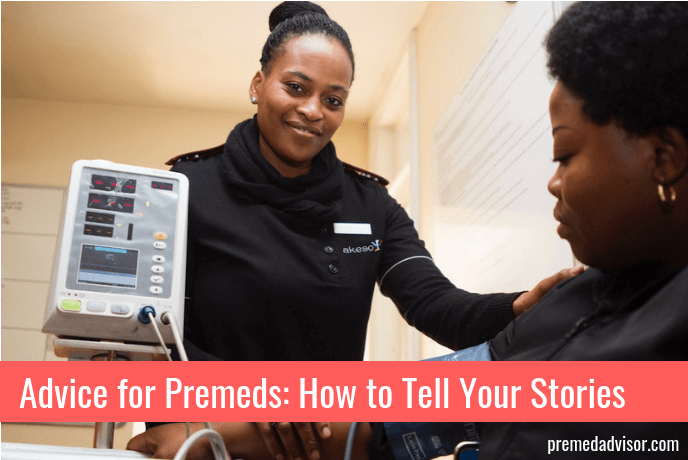Your Stories: How to Tell Them
How to draw anecdotes out of meaningful experiences, reflect on them, and write about them for medical school statements, essays and interviews.
Physicians take patient histories for many reasons: to establish rapport, to understand the community and family influences on the patient’s health, to gather relevant facts to make an accurate diagnosis, and to establish a treatment plan the patient can feel empowered to execute. Doctors are trained to look for evidence with a curious and scientifically grounded mindset.
In your essays and meetings with admissions people, cultivate, feed and stimulate that evidence-based mindset. Embody your medical mind, describing your feelings, sensations, insights, and responses to the meaningful experiences that shaped your path to medicine. Share the truth of who you are through a deft and well-drafted hybrid blend of simple, thoughtful declarations and pithy, relevant anecdotes–––condensed stories with narrative appeal.
Where Do I Even Start?
Settle into a comfortable place that you can count on to be quiet and free of external distractions. Direct your thoughts from the present backward over your life, in reverse.
Emotional memories are a good launching point. Ask yourself what particular events during the last three years have been unforgettable? What made you cry? What made you really happy? What felt satisfying? Your emotional responses are guideposts to stories that will have a similar impact on readers. You can think of meaningful experiences involving friends, family, and even clinical experiences. Just make sure you are the center of the story.
Write down everything you can think of without judging yourself. Remember that this will be edited later. You have time to balance the tone between full-of-yourself and abjectly humble. For now, just recall and record. You can use a microphone, a keyboard or a pencil.
What Makes a Story Powerful?
A story is powerful when it causes an emotional response in the reader. It’s all in the words you choose and the order in which you place them. Consider the following two descriptions of the same brief incident.
- A mouse I was working on in the lab late at night suddenly had a heart attack, right in my hand, and stopped breathing.
- I will never forget the first life I saved, even though it was just that of a little white lab mouse.
Which of these is more emotionally moving to you? Most people would say the second one. This is because the writer shares her perceptions of the event with you, while she is describing it. You feel you know a little of what matters to her. The first sentence is medical and has a hook quality, but it’s impersonal. Also, with medical details, you have to be very cautious because doctors are steeped in these experiences and pretty habituated to them.
The best way to turn your anecdote into something that will move your reader is to share your inner responses. This also feels more honest to the reader. You may take for granted that a clinical fact (“the mouse died”) becomes more real when we hear that this was the first life you saved – it becomes a meaningful experience. We know that you are deeply invested in saving lives, which is what doctors care about and do.
Where Can I Turn for Help?
Your family and friends, who love you, know a lot of stories about you. Ask them to share their recollections, then write them out in the first person. Look back at old narrative grade reports; think of comments made by teachers, coaches and counselors that made you feel proud. Write them all out. And while you are at it, think of what makes you proud of yourself. The meaningful experiences that you identify will often provide the evidence for your best qualities and authentic values. You can also give a friend a list of questions to ask you.
Start a Journal Now
Regularly reflect on and write about experiences that surprise you, move you, and inspire you. Remember to write about your role in the story.
Whenever it’s time to apply for the next level of training, now medical school, later residency, then fellowships, then jobs….your success will be greatly enhanced by your ability to tell your story in a compelling way that moves the listener and gives you professional and personal credibility. Resistance is futile. Start spinning those yarns to reach your dreams.
We will end with a beautiful illustration of how to spin a story by medical student Asal Homayouni.
“After my grandmother’s passing, writing became a cathartic outlet for me. In many ways my grandmother’s death is the reason I wanted to become a writer, and my journey with the written word is why I want to become a doctor.”
Photo by Hush Naidoo on Unsplash
